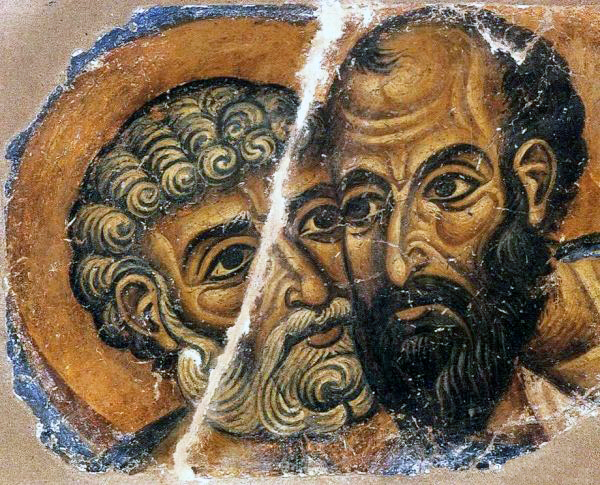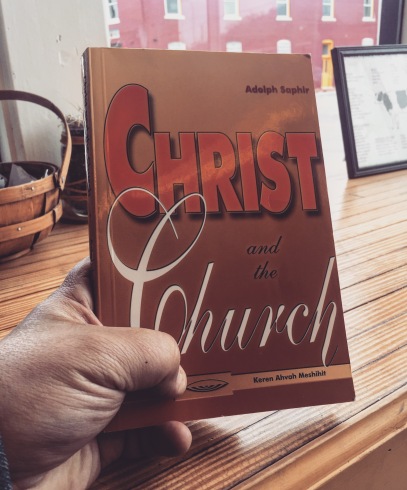
“…the One who ascended far above all the heavens, that He might fill all things… gave apostles…” || Eph. 4.10b-11a
There is much confusion aswirl over the subject of apostleship, especially as it relates to the question of whether or not it should be seen as an ongoing ministry in our day.
Some would say, “Apostles ceased to be when the last of the Twelve died.”
Others would say, “Apostles ceased to be when the canon of Scripture was closed. We don’t need apostles today because we don’t need more Scripture written.”
Others, especially in Charismatic and continuationist “missional” circles might say, “Apostles exist today. They are the movers and shakers, market-place influencers, or the ones gifted to build ministries that have profound impact on the Great Commission and give aid to churches on various levels.”
Still others would say, “Apostles exist today and have authority to govern regions and to oversee multiple churches and ministries.”
To be sure, confusions abound and emotively charged opinions often fuel fiery debates with regard to the issue of apostleship.
My main three aims in this article are to survey two of the primary errors when it comes to thinking of apostleship (the first of which is not so modern but is still prevalent today), namely, (1) objections to the ongoing necessity of apostleship and (2) unbiblical modern apostleship claims and views, and (3) to offer what I believe to be a view of apostleship that is grounded in Scripture and is therefore indispensable to the life and mission of the Church in the NT vision, and which remains applicable today, even until Christ returns in glory.
So, the cat’s out of the bag. I am convinced that apostleship is meant by our Ascended Lord to be an ongoing ministry in our day— indeed, an ongoing ministry until the “Apostle and High Priest of our confession” returns. What this means may be surprising to some of you, but if you give thoughtful consideration to what I’m presenting you will find that none of the ideas I hold forth are either novel or extra-biblical. I am convinced that apostleship is indispensable chiefly because I hold to “Sola Scriptura”, not in spite of my reverence for and conviction to the inerrancy and sufficiency of Scripture.
This raises a host of questions from various angles, of course, and I haven’t the time here to raise and address all of them. Let me focus on what I believe to be the two primary errors in our day when it comes to the issue of apostleship.
Error #1: The Cessationist View Regarding Apostleship
The Cessationist view, specifically with regard to apostleship (usually including a view that prophets too have ceased to be), is the view that with the death of John the Apostle (the last of the Twelve), or more commonly, with the closing of the Canon of Scripture (or when the last NT book was written), there no longer remained a need for apostles, as their primary role was to unfold the mystery of the Gospel in an authoritative and Biblical sense, first as preachers, then as authors of the NT.
In this view, the mystery “kept hidden for ages” had now been disclosed in Christ (which is true according to Rom. 16.25), the Scriptures had been written, and since this was (in the their view) the primary role of the apostles, none were any longer needed for the ongoing mission and upbuilding of the Church. I happily agree with the first part of that statement (that Scripture-writing apostles had an authority unique to themselves in relation to the foundational, post-resurrection/post-Pentecost proclamation of the Gospel and authorship of NT books), but I differ with the last part (that apostleship ceased altogether with the completion of the Canon).
I share some sympathies with those who hold to this view, though in the last analysis I find its conclusion about the cessation of apostleship to be unbiblical. My sympathies lie with the fact that those who hold to this view are eager to uphold the supremacy and uniqueness of Biblical revelation. That is a conviction that self-proclaimed apostles as well as missiologists of various stripes have disregarded in our day, and it has been the seedbed of many ills.
The Cessationist’s fear of present-day apostles (and prophets) often issues from a high view of the Bible, coupled with the assumption that the apostolic ministry is a foundational revelatory ministry- which was of course true for the the apostles who were given the task of writing portions of our NT. If claims of modern apostleship are made, Cessationists assume, so might there be claims of new revelations which are not in keeping with the testimony of Scripture. I understand that fear, and it is a healthy fear on the front end— we should flee from any would-be Bible-twisters or new Scripture-writers. However, I believe Cessationist conclusions are misguided for many reasons, while I commend them for being jealous to guard the truth of the Word. They have valid reasons to maintain this concern due to the abuses of self-proclaimed apostles, and where it applies I agree with them. But when we take “the whole counsel of God” into view (that is, the whole Bible), there’s much more to be considered than the Cessationist view offers.
Let us consider some of their objections to present-day apostleship. For brevity’s sake, I’ll give a few short thoughts in response to each one.
Primary Objections Made by Those Who Believe Apostles Have Ceased
Objection I. “We don’t need apostles today because Scripture has already been written.”
Is this a true statement?
I don’t think so, and here are some of the reasons why.
As is clear from the Bible itself, the authorship of Scripture was ever meant to be definitive of apostleship nor exclusive to apostleship. There is much I could say on this point, but here are some reasons why this point is erroneous, if even well-intended.
a. Not all apostles wrote Scripture. In fact, most of the apostles named in the NT didn’t write Scripture. Only a few of the original 12 wrote Scripture (Matthew, Peter, John), and of the other 10 or so names associated with apostleship in the NT, only a few were given the authoritative role of writing what would become Scripture (Paul, as well as the author of Hebrews, if in fact it wasn’t Paul).
b. Not all the authors of Scripture were apostles (nor were the remainder all prophets). This is glaringly obvious when we survey the whole of the Bible.
First off, if the authorship of Scripture was exclusive to apostleship the entire Old Testament would not be Scripture! That is absurd, and I’ve never heard anyone make that claim.
Not counting the Old Testament, Mark, Luke (whose Luke-Acts combo constitutes more of the NT’s content than Paul’s epistles!), and perhaps James, respectively.
I needn’t belabor this point. There is no way to make a case from the Bible that biblical authorship was either definitive or exclusive to the role of apostleship. Simply put, some apostles were chosen and uniquely empowered by God to write some of the books in the Bible, but not all apostles were given this task, and the majority of the men chosen by God as instruments for the penning of Scripture were not themselves apostles. We may conclude confidently that the authorship of Scripture was neither definitive nor exclusive to the role of apostleship.
Objection II.
“Jesus chose the twelve, and Paul was the only other apostle, since he also had ‘seen the Lord.’ (1 Cor. 9.1) Any subsequent claim to apostleship is a presumptuous thing at best, and at worst, a destructive kind of deception- even a blasphemous claim.”
This point, which has cemented into a rather common tradition, is purely based on historical and biblical ignorance. Here are a few reasons it cannot be true:
a. Within the NT text itself, there are at least 10 men besides the 12 directly called ‘apostles’ or named amongst the company of apostles (c.f. Acts 1.26, 14.14; Gal. 1.19; 1 Cor. 4.6, 9; Rom. 16.7; 1 Thess. 1.1, 2.6; Phil. 2.25). Even if you seek to argue that some of these were comrades of the apostles but not really apostles, you cannot make that case for all of them, as many of them are explicitly called apostles in the texts provided. There is no sound hermeneutical approach, no commendable exegesis of these texts which would lead us to conclude that some, if not all of the names mentioned herein were not known as apostles in the early church. The idea that only the 12 plus Paul were apostles is not confirmed in Scripture.
b. Ephesians 2.20 and 4.11ff never specify that the work of the apostles (and prophets) will only continue in the sense that their Biblical testimony is foundational for the Church.
Is apostleship by nature foundational? Without question. Any deviation from the Biblical prophets and apostles should be feared and rejected as error. But nowhere does the text teach or even imply in the slightest sense that the ongoing equipping and upbuilding of the church is the work of pastors, evangelists, and teachers only.
It is an acrobatic feat of interpretation (not without some sleight of hand) to pluck apostles and prophets out from this text, or to define them as first-century ministries while the other ministries are to be ongoing.
I understand why many have concluded this, and I sympathize with the well-meaning intention to maintain a high-view of Scripture, but I think it eventuates in a diminishing of the Bible at the end of the day. It is a twisted exposition of Eph. 4.11 and other Biblical texts regarding apostleship. Often this is done unconsciously or because of theological traditions that go back some centuries. Nonetheless, a poor interpretation of Scripture and the elevation of opinions and extra-biblical traditions is the antithesis of a high-view of the Bible, not the reverse. The original 12 certainly had a unique apostleship as eye-witnesses of the Lord’s ministry, and they will have a privileged place in the age to come, as Matt. 19.28 makes clear. Certainly Paul’s apostleship was tip-of-the-spear and unique as the original pioneer apostolic work among the Gentiles, not to mention that he was given the task of writing works that would make up a large part of the NT. No post-biblical apostle will ever do that, and if he claims to, he is disqualified and should be avoided at all costs. But this does not prove that apostleship itself has ceased.
It should also be noted that none of the apostles, even the ones who wrote Scripture, were in and of themselves immune to error or short-sightedness. In other words, none of the them were Jesus, and none of their lives as a whole constitute the Canon of Scripture. That which the Holy Spirit breathed out in Scripture, both historically and didactically is what constitutes the Word of God. It is the Scriptures that are infallible, not the men who were used of God to write them. Even within the Scripture itself, we see occasional disagreements amongst the apostles. These do not prove the fallibility of the Bible, but rather the fallibility of all men, save the Man Christ Jesus. Our faith is in God and the Holy Scriptures, not in the apostles as men.
c. Paul speaks about false apostles in his epistles (1 and 2 Cor. especially), and Jesus commends the church in Ephesus for finding false apostles to be false. Why does this speak to the necessity of ongoing apostleship? Because the ground of their falsehood was not as cessationists claim today, “No other apostles besides the 12 and Paul were meant to be given to the Church.” Rather, the ground of their falsehood was their lack of Christ-likeness, their poor doctrine, their lack of true servanthood, their poor grasp of the Gospel, and on and on. They had not truly been sent by the Head of the Church, and that marked them out as false. Paul never said, “They’re false, because they are neither among the 12, nor are they me. Me and the twelve are the only apostles ordained by the Lamb.” Of course not. They were false on other grounds.
In other words, they were disqualified from being counted as apostles because they had not been shaped and sent by the Lord in a manner which pleased His heart and was in keeping with His Word. The fact that there were false apostles meant that there ought to be true apostles, and there is no biblical reason to assume that this ought not to be the case today. There are fakers today, and the need for true apostles is of paramount import still.
d. You cannot be an apostle without a Christophany, and all claims to modern Christophany are false.
Gordon Fee gives another angle on this in his commentary on 1 Corinthians:
Along with 15:8 this question establishes two things: (a) Paul believed that his experience on the Damascus road was more than a mere vision. For him it was a resurrection appearance of a kind with all the others—to be sure, after the ascension and therefore out of due season (15:3–8). (b) But since others who saw the Risen Lord did not become apostles, what most likely legitimized his apostleship was the accompanying commissioning. Although he does not say so here, in Gal. 1:16 the revelation of the Son of God is accompanied by its purpose, “that I might preach him among the Gentiles” (cf. 15:8–11, where the resurrection appearance is followed by discussion of his apostleship).
Fee, G. D. (1987). The First Epistle to the Corinthians (p. 395). Grand Rapids, MI: Wm. B. Eerdmans Publishing Co. Emphasis mine.
In other words, the qualification for apostleship came with the Christophany, it wasn’t the Christophany itself. It was rather, that when the Lord appeared to him He simultaneously commissioned him as an apostle. This is an important observation, and distinguishes Paul’s encounter with the risen Lord from the encounters of other believers who never entered the apostolate. It seems clear to me that the Lord of the harvest intended other apostles to be sent, not merely the 12 and Paul. After all, the prayer of Matthew 9.37-38 is still binding upon the Church, as long are there remain unreached peoples. Therefore, we need not just any kind of worker, or missionaries defined however we please to define them. We need apostles.
In connection to this, let us think about 1 Cor. 9.1. As we’ve noted, it is often said that since Paul had “seen the Lord”, a Christophany was required for one to be called as an apostle. 1 Cor. 15.3-11 may seem to contain an even stronger argument for this idea, and it is quite understandable that many would come to this conclusion from the text. The 12 had seen the risen Lord, and Paul encountered Him on the road to Damascus, as well as later in a time of prayer in the temple (Acts 22.17-21). Many conclude from this that a visible/audible encounter with Jesus is a qualification for apostleship. Is that what Paul was saying? I don’t believe so.
I do see how this could be a point of confusion, but I believe Paul actually answers his questions within the texts themselves. The point of 1 Cor. 9.1 is to give defense of his character and role to the Corinthian church. His aim was to undergird his exhortations regarding food sacrificed to idols (ch. 8), and to reiterate the divine right of an apostle to receive financial support from the churches to which he was rightly related (ch. 9). Thus, he asks several questions. “Am I not free? Am I not an apostle? Have I not seen Jesus our Lord?”
Paul’s motive here is not to give a list of qualifications for apostleship, but to defend his apostleship for the sake of building up the Body of believers at Corinth. He is not saying, “All apostles must have visibly seen the risen Christ.” We must take into account the fact that while the 12 had all seen Him, and some of the other apostles in the NT may have been present when the 500 witnessed the ascension, we have no explicit record of every apostle in the NT seeing Christ in this way. Nor does the Book of Acts or the other Epistles mention a Christophany as a qualification for apostleship. We may assume that they all did, but this would be an assumption still. This is not sufficient ground to conclude that apostles (or from the Latin: missionaries) are no longer necessary to the task of the Great Commission.
The primary point of 1 Cor. 15.3-11 is indeed the supremacy of the Gospel and the reality of Christ’s resurrection, for which reasons Paul is mentioning all of those who saw the Lord in His resurrected state.
Another reason I don’t think Paul was putting forth a Christophany as a qualification for apostleship is that Paul was not the last apostle called and sent in the NT, though he does say, “last of all, as to one untimely born, He appeared also to me.” Some of the apostles mentioned in the texts above were not only called and sent after Paul’s commissioning, a few of them were even led to the Lord and discipled by Paul, Timothy and Titus being a few examples. Did they have a Christophanic experience? Certainly no text makes this clear.
Not only that, but Paul mentions the 500 others who saw them, the vast majority of which probably never became apostles. We have no record of them all being sent in the apostolic sense, and if we did, this would disassemble the idea that only the 12 plus Paul were apostles. Was Paul’s main point that apostles must have a Christophany, or that Christ in fact had risen from the dead, and that there were many witnesses to the fact? I believe the latter is the case more warranted by Scripture.
There is, however, a qualification for true apostleship given in 1 Cor. 9, and it is not the requirement of a Christophany. It is found in vv. 1b-3:
“Are not you my workmanship in the Lord? If to others I am not an apostle, at least I am to you, for you are the seal of my apostleship in the Lord. This is my defense to those who would examine me.”
In other words, true apostles will preach the Gospel, make disciples, and plant and nurture churches. Their seal of approval is seen in the Christ-glorifying churches which grow out of their planting and watering. God gives the increase, and the fruit of the Spirit vindicates the authenticity of the apostle.
Many today may claim to have Christophanic experiences, and they have throughout Church history. Some of them may be true, but many (I would assume most) of them are false. But you cannot fake the establishment and growing in grace of a family of believers, who previously were bound in darkness, sin and idolatry, and who through the faithful preaching of the Gospel are now serving the living God, growing in holiness and humility, treasuring and obeying the Scriptures.
Much more could be said of the Cessasionist view, but that will have to suffice for now. Let us look to another erroneous and rather widespread view regarding modern-day apostleship.
The “New Apostolic Reformation”/Charismatic “Third Wave” View
I have already written much more than intended, so I’ll be as terse as possible here.
For the last three decades or so, there has been an emphasis within the wider Charismatic movement on apostleship. Some have dubbed this emphasis The New Apostolic Reformation, though all Charismatics who hold to present day apostleship would not consider themselves to be a part of the movement specifically. You can find out more about this online or through a number of publications, though I must say, these are rather shark-infested waters.
On the one hand, much of what you’ll see from the so-called “N.A.R.” (and spin-offs from it) will be troubling, and in my estimation, we should be troubled by much of it. On the other hand, many who seek to criticize modern-Charismatic emphases on apostleship often do so in venomous, slanderous ways, usually lumping all charismatic believers into the mix with leaders and teachings that the wider circle of Pentecostal/Charismatic churches wouldn’t be in harmony with on all points.
It is a task quite daunting to wrap one’s mind around this, and in some ways it is impossible to know the whole of the matter. It is unprofitable to spend too much time investigating it. There are so many variations and streams that overlap in this category that we must be careful not to caricature or misrepresent true brothers and sisters in our pilgrimage for truth. The spectrum is rather large, with some so-called apostles being outright charlatans while others are genuine brothers and sisters who are eager for God’s glory, but may have misunderstandings of apostleship because of how they’ve been taught.
This is crucial to remember, for there are many faithful Pentecostal/Charismatic men and women of God all over the world, many of whom have suffered greatly for the faith and led many sons to glory. It is an error to lump all Pentecostal/Charismatic churches in with the false apostleship we’re speaking of, even though most of those who claim apostleship are found within Pentecostal/Charismatic churches and movements, generally speaking. There are likely a great host of servants in the nations who are continuationists, most of whom will never be known on the popular level, whose ministries are very much in keeping with true apostleship in terms of their character, their suffering, their doctrine, and their fruit. This must be acknowledged as we think about the aberrations.
That said, let me note just a few of the erroneous assumptions that have been espoused, especially over the last 20-30 years or so under the auspices of C. Peter Wagner and his colleagues. I name him here not to demean him, but to say that since his books and teachings were quite public and influential, the errors which sprung from them need to be addressed rather than ignored. It is an unfortunate thing that many Charismatic leaders have been unwilling to address these things publicly, but I am convinced that many false claims to apostleship have been made as a result of these teachings, and the subject is too precious in Scripture for us to permit these distortions.
I. The Idea of Apostles as Ministry CEO’s or Regional Overseers
Within the N.A.R., apostles came to be defined as men (and women) with remarkable organizational gifting, often smacking of a Bill Gates type of leader- one with outstanding abilities to influence and build large organizations. It was even claimed from time to time that men like Steve Jobs had an apostolic calling, but failed to fulfill it because they did not follow the Lord. This is an unbiblical idea. Our giftings in the Church are Spiritual- and unregenerate men cannot have them. Natural giftings can certainly be squandered. This happens all the time. But an “apostolic calling” is not given to unregenerate men.
Certain leaders in the movement were eventually branded “apostolic overseers” of a whole cluster of churches or ministries, especially as they were gifted to execute things administratively. Portions of Paul’s epistles were cherry-picked to affirm this, usually devoid of their real meaning and context, and these men were seen as problem-solvers, movers and shakers, and this came to define apostleship within the movement. The NT idea of a gospel-grounded, relationally-oriented, sacrificial servant-apostle was scarcely emphasized, and an unbiblical model emerged. The central-to-Paul character and doctrine of “Christ crucified” was scarcely considered among those who who were being “appointed” to apostleship. I am sure that there were exceptions to this within the movement, but by and large this seemed to be the flavor of things.
One would be hard-pressed to assume that Paul the apostle, the prototypical “sent one” to the Gentiles, was anywhere nearly as impressive as these figures in a worldly sense. 2 Cor. 10 bears this out in no uncertain terms. His strength was demonstrated in the weakness of his features and skills, in many ways, God’s power being perfected and magnified through his weakness and his sufferings. The fragrance of worldly success is not the “fragrance of Christ” which characterized NT apostleship, which was marked by humility and holiness, godly sorrow and joy unspeakable.
The theology of the NT apostles, the character of the NT apostles, the churchmanship of the NT apostles, and the Gospel mission of the NT apostles was on the periphery of the movement at best, and often, it was nowhere to be found. Hence, one should regard the movement, by and large, to be false, even if some of its proponents were true brothers. They did not qualify biblically to function as apostolic servants.
II. The Idea of “Apostolic Alignment”
I find no pleasure in digging this one up, in fact it pains me. But I find it necessary to address. The stakes are too high to be silent about it.
It became common within this movement to speak of “apostolic alignment”, the process by which Dr. Wagner and others of his company would “align” other ministries with themselves, appointing them as new apostles, prophets, or influencers of other kinds through the laying on of hands. It is Biblical for men to be appointed to different roles of leadership by the Church through the laying on of hands, but within the N.A.R. this happened on rather unbiblical and unreal grounds.
One dramatic case of this was seen on the international stage when Todd Bentley of the “Lakeland Revival” was “apostolically aligned” in a ceremonial appointing in 2008. Dr. Wagner and many of his colleagues were present at this event and gave sanction to it. It would soon be exposed that Bentley was engaged in an immoral relationship, which itself disqualified him from being a leader in the Body of Christ of any kind, not to mention his being appointed to a role with grandiose claims about him being a prototype for all future evangelists and revivalists. Despite the claim of real apostolic activity in this “alignment”, there was evidently little to no real accountability or viable relationship involved in the process. This is characteristically non-Pauline. There was no context by which his character and doctrine could be assessed. But Paul told Timothy not to lay hands on men too hastily, lest we “share in their sin.”
This display on a wide public platform should only be seen as destructive and false, and the usage of “apostolic” language only served to make it all the more tragic. This kind of “Apostolic alignment” is a “Saul before the David,” and as much as the N.A.R. might have cried for its prospering, it was totally untethered from the spirit of NT apostolic sending. However much the language of “apostolic” was used, it was by its very nature the antitheses of New Testament apostolicity, which is characterized by a radical jealousy for the Name of God, a deep-seated submission to the Scriptures, a profound love for the Body of Christ, and a fatherly/brotherly kind of relatedness to all who are appointed to roles of leadership within the Church.
Too much goes on without being “in the light” in these kinds of ceremonies. It might be said that these kinds of appointments are more akin to Bill Gates hiring a new regional director at Microsoft than they relate to the healthy appointing of a leader in the church. In fact, they may be even less accountable and honest. This should not lead us to demonize all within the movement, but this kind of thing should never have been tolerated. We ought all to tremble at the manner in which we are relating to one another as the church, and to be much more cautious about the way in which we are appointing leaders.
The aftermath of the Lakeland incident was tragic and multi-layered, but it is not uncommon (though often much less public) in such circles. Poor examples of this kind can be found in more traditional church settings as well, but we are thinking about claims to apostleship in this article, so that is my focus here.
These examples ought to be enough to compel us to look for light from the Scriptures. Wagner was, after all, correct in concluding that there ought to be (and are) apostles in the Church and in missions today. In fact, he was right about several things. But the errors which came out of this movement are more grave than I have time here to convey, and a humble and prayerful return to “the whole counsel of God” in Scripture should be our watchword.
For the last section of this article, I would like to focus on the Meaning, Purpose, and Indispensability of Apostleship.
The Meaning of Apostleship
If we would rightly grasp the meaning of apostleship according to the Scriptures, I suggest that our understanding of it must be both de-mystified and sanctified.
Apostleship De-mystified
This speaks primarily to the cessationist view of apostleship and its ripple-effects throughout church history.
The apostles of the NT were not super-heroes, nor were they elite saints whose role it was to write the Holy Bible. As noted above, some of them did write some of Scripture, but this was not their role as a whole, nor is this the meaning of “apostle” in the NT sense. We need to be freed from Romish influences which Popify Peter and posterize Paul. These issue from a low view of the Gospel.
The apostles of Scripture are, after all, our brothers. The Lord laid His hand upon them, shaped and sent them, but they remained men— trophies of grace, not icons to memorialize. Leaders to follow, not men to worship. Peter and John as well as Paul and Barnabus charged their would-be worshippers not to exalt them, “for we are only men like you.” Of course, the original twelve had a unique kind of apostleship (Mt. 19 bears this out), and I repeat, the authority to write Scripture does not continue today. Any claim to apostleship that includes new Scripture being written is patently false and inspired by Satan. But even among false apostles today, the claim to this authority is rare.
We do need apostleship to be demystified today. None of us as orthodox evangelical believers would claim to worship the apostles, but we have mystified their lives as if they were saints of a higher class. In fact, they were not. They may have been more Christ-like than us, but the possibilities of grace were not confined to them. The same Gospel which saved them has saved us, and the same Spirit which sanctified them is yet sanctifying us. This is one of the main points of NT apostolic teaching. The apostles meant for us to follow in their train, not to exalt them as ends in themselves. We are to look upon them, and seeing through them, to behold the One who means to conform the whole of the Church to His image.
The Canon of Scripture is superior in perfection and authority to all else that is taught in Church history, but again, it’s authorship is not exclusive to the role of apostleship. The Biblical Gospel is the authoritative Gospel, whether it came through Paul the apostle or Isaiah the prophet, or Luke the Physician.
The apostles of Scripture were not to be seen as the source, but rather as those who were ever pointing to the Source, serving as an example to the saints in character and doctrine, and a special example to apostolic servants/missionaries in every generation. We must de-mystify them in this sense. We cannot “follow Paul as he follows Christ” if we think that he was cut from finer cloth than we. This is vital for the fulfillment of the Great Commission. Apostles were not super-heroes or virtuosos.
No, Paul’s dust was the same as ours and his Christ is the same Christ as ours, so long as we are submitted to the Scriptures and drinking of the same Spirit. The “chief of sinners” was a precious servant of Christ, shaped by the grace of God, and held forth as a pattern for us, not as an ivory-tower monument, untouchable and unreachable. Let us not belittle the grace of God by mystifying who the apostles were.
Apostleship Sanctified
This speaks more to those who would claim that apostles are for today, but whose view of apostleship is not in keeping with the picture laid forth in the Scriptures. Of course, this applies to the cessationist view as well, as all of our false assumptions regarding apostleship need to be purged and brought back to the foundational ground and definition laid forth in Scripture.
I address here the more Charismatic views because I believe that the word “apostle” has been cheapened and made too common by their claims. While I’m eager not to explain apostleship as something that has ceased, or something that is so elevated that we could never think of seeing it at work in our day, I’m equally leery of the cheapening effect that false claims to apostleship have had on the church and its mission. This foul treatment of apostleship has been especially flagrant in the Charismatic world, and though I am myself continuationist, I am compelled to address it.
Perhaps it would be fitting here to insert my conviction that apostles and missionaries are one and the same, in the Biblical sense of the words. “Apostle” comes from the Greek and “Missionary” comes down to us from the Latin. Apostleship (or the missionary call) should be be defined from the Scriptures that it came from, and hence, when we think about the role of an apostle (or the role of a missionary) Scripture itself must be our guide and authority.
If one of the roles of true apostles, as it was in the Bible, is to appoint elders/pastors who qualify to serve in accordance with 1 Tim. 3, Titus 1, 1 Pet. 5 and Acts 20, then it should go without saying that apostles themselves should bear the same kind of character, doctrine, and spiritual wisdom which is required of elders/pastors on a local level. Elders/pastors are not merely men of elite intellect and morality, as if their qualities issue from themselves, but they are humble and godly men who have been shaped over time by the faithful hands of the Potter. Apostles must be shaped by God in like manner. Thus Paul exclaimed, “You saw what manner of men we were among you.” “I am what I am by the grace of God.”
We must return to understanding apostleship in accordance with the example we see in the New Testament. Therefore, unless we are basically gripped with and grounded by a Biblical vision of apostleship, our view must be sanctified, that we might rightly pray for and equip sent ones by the help of the Scriptures and the power of the Holy Spirit.
The Purpose of Apostleship
Why did the Lord ascend on high and give the gift of apostles along with the other gifts mentioned in Ephesians 4.11? Let us look to the text itself for the answer:
“…to equip the saints for the work of ministry, for building up the body of Christ, until we all attain to the unity of the faith and of the knowledge of the Son of God, to mature manhood, to the measure of the stature of the fullness of Christ, so that we may no longer be children, tossed to and fro by the waves and carried about by every wind of doctrine, by human cunning, by craftiness in deceitful schemes. Rather, speaking the truth in love, we are to grow up in every way into him who is the head, into Christ, from whom the whole body, joined and held together by every joint with which it is equipped, when each part is working properly, makes the body grow so that it builds itself up in love.” || Eph. 4.12-16
Simply put, along with prophets, evangelists, pastors and teachers, apostles were given by Christ to equip the saints for the work of service, and to build up the Body of Jesus in the nations.
They are sent to proclaim the Gospel where it has been named and where it has not been named (Acts 2, Rom. 15), to make disciples (Mt. 28.16-20), to impart spiritual gifts (Rom. 1, 2 Tim. 1), to plant and nurture churches (Acts 20, 2 Cor. 11.28), to appoint elders (Acts 14.23, Titus 1), and to do this in an ongoing manner until the fullness of Christ characterizes the Church and every people group has been penetrated with the light of the Gospel (Mt. 24.14).
Apostleship is synonymous with true missionary work. Missions work that is devoid of the character, doctrine, and ways of NT apostleship is by definition non-missionary, sub-apostolic. Claims to apostleship that are not in keeping with the missionary labors of the NT apostles are by definition sub-apostolic.
Apostles and Missionaries, from a biblical vantage point, are one and the same (a study of the Greek and Latin from which we derive “apostle” and “missionary” reveals this). Many have claimed apostleship cheaply, and others have claimed to be missionaries with little or no apostolic character. We cannot settle for this, saints. We must de-mystify and sanctify the meaning of apostleship/missions with the help of the Scriptures.
The Indispensability of Apostleship
In light of these things, it should be seen that apostleship is indispensable to the fulfillment of the Great Commission, which is the establishing and building up of local churches amongst every tribe and tongue.
We cannot be the church nor fulfill our mission without true apostles. Let us look to the “Apostle and High Priest of our confession”, the One who shed His blood to purchase men from every tribe. Let us “therefore pray earnestly to the Lord of the harvest to send out laborers into his harvest.”
Is apostolic ministry indispensable? Is it needed today?
“If we’re thinking of an ‘apostle’ in Biblical terms, that is, a ‘sent out one’, with a ministry that’s really establishing God’s work where God’s work is either absent or extremely weak (which is really what the apostles were doing in a general sense) then yes, we do need God to raise up such signal servants, who will draw the attention of both the churched and the unchurched people to the claims of the Lord Jesus Christ, sometimes at great sacrifice to themselves. Because they are so taken up with Christ… Christ is being preached. In that sense we need to pray, in our different towns, cities, countries… that God will raise up such clear voices— individuals whose ministry will be trail-blazing for others.” || Conrad Mbewe, Pretoria, South Africa, October 14th, 2010
Let us return to the Scriptures. Let us return to prayer. The Gospel is too precious a message, the destiny of men too ponderous, and the Name of Christ too holy for us to “sit at ease in Zion” while the world around us perishes. The task before us is great. We don’t need youthful goers or adventure-seekers. We need apostolic servants. Surely, the Lamb who was slain is worthy of “sent ones.” This is no small thing, but it is indispensable to the Great Commission.
“Then He said to His disciples, ‘The harvest is plentiful, but the laborers are few; therefore pray earnestly to the Lord of the harvest to send out laborers into His harvest.'” -Mt. 9.37-38












